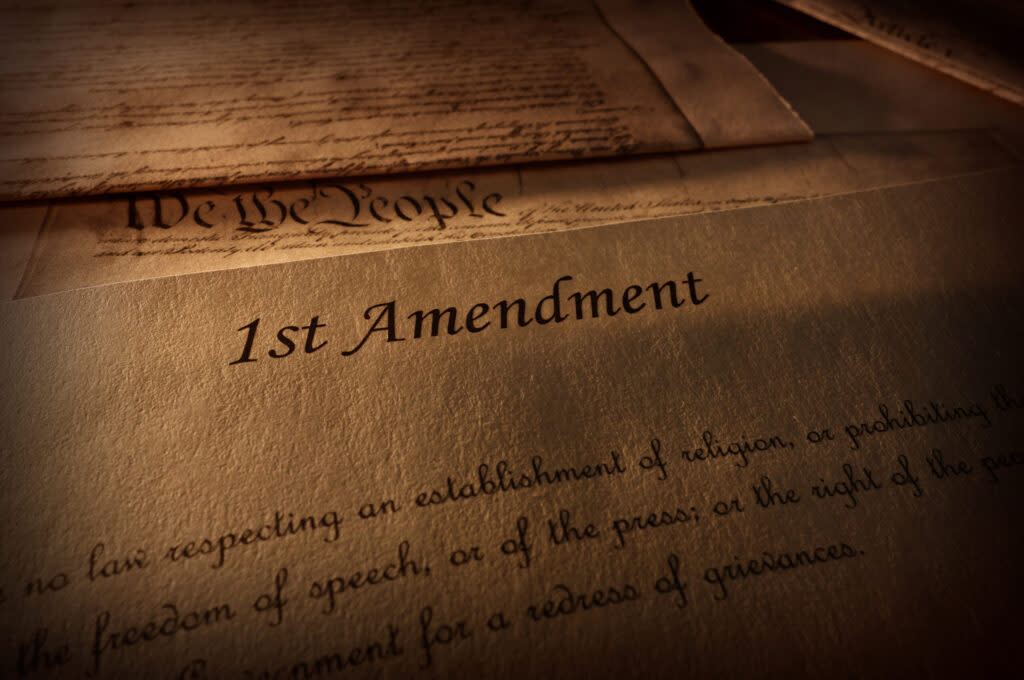The danger of Christian nationalism

First Amendment of the U.S. Constitution. (iStock/Getty Images Plus)
The right to practice religion, or no religion at all, is among the most fundamental of the freedoms guaranteed by the Bill of Rights.
As enshrined in the First Amendment, religious freedom includes two complementary protections: the right to religious belief and expression and a guarantee that the government neither prefers religion over non-religion nor favors particular faiths over others. These dual protections are supposed to work hand in hand, allowing religious liberty to thrive and safeguarding both religion and government from the influences of the other.
But across the country, we are facing an attack on religious liberty from Christian nationalists.
We’re seeing it in North Dakota, too. A recent North Dakota News Cooperative poll of North Dakota voters found that Republicans in the state have conservative Christian ideals they believe should be reflected in political decisions and that 42% believe “God has called Christians to exercise dominion over all areas of American society.”
I want to be clear about my language here: This attack – both nationwide and here in North Dakota, is from a small but growing group of extremists that is distinct from Christians. Most Christians believe strongly in religious freedom, as do Americans of all faiths and no faith.
But that’s not what Christian nationalism is.
According to Christianity Today, Christian nationalism is “the belief that the American nation is defined by Christianity, and that the government should take active steps to keep it that way. Christian nationalists assert that America is and must remain a ‘Christian nation.’ ”
This is a dangerous idea that plays fast and loose with our history. If the founders of our country wanted an officially Christian nation, that concept would appear in the Constitution. The question was debated. Some delegates to the Constitutional Convention argued for formal recognition of Christianity in the Constitution. But ultimately, the framers did not adopt that view.
Instead, there are no mentions of Christianity in the Constitution, and religion is mentioned only three times: to prohibit attempts to establish a national religion, to prohibit infringing upon the free exercise of religion, and to prohibit religious tests in order to hold public office.
Many of our founders were Christians. Many were not. Regardless of any evidence of Judeo-Christian influences, it’s clear that the country was not founded as an official Christian state. But that is a core belief of Christian nationalists, and they hold that Christianity should be paramount in policy making and setting society’s morality.
We see that in the kind of policies they champion, like reinstating prayer in public school, changing school curriculum to include Biblical education and the 10 Commandments, banning books from libraries, and discriminating against LGBTQ+ people. And much of their advocacy for these policies is characterized by a fervent belief that Christians are being persecuted when they should be elevated.
But Christian nationalism rejects religious freedom and distorts both the Christian faith and America’s constitutional democracy.
Religious pluralism is vital to our democracy. The framers of the Constitution knew that, and most Americans today know it, too. Without it, we throw open the door and toss out the welcome mat to anti-Muslim bigotry, anti-Semitism, and second-class citizenship of those who have no faith at all.
That’s why we must recommit to the foundational ideas of religious freedom for all.
People of all faiths and none have the right and responsibility to engage constructively in the public square.
One’s religious affiliation, or lack thereof, should be irrelevant to one’s standing in the civic community.
Government should not prefer one religion over another or religion over nonreligion.
Religious instruction is best left to our houses of worship and other religious institutions.
We can’t let Christian nationalists ignore our history and remake our future. I won’t. And there are people of all faiths standing in the way of this dangerous movement. I hope you will stand in the way, too.
The post The danger of Christian nationalism appeared first on North Dakota Monitor.

